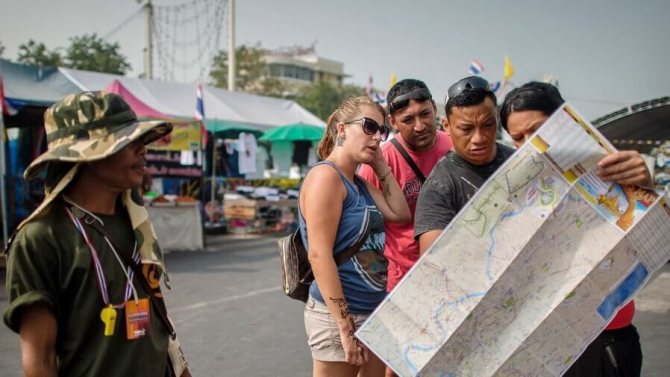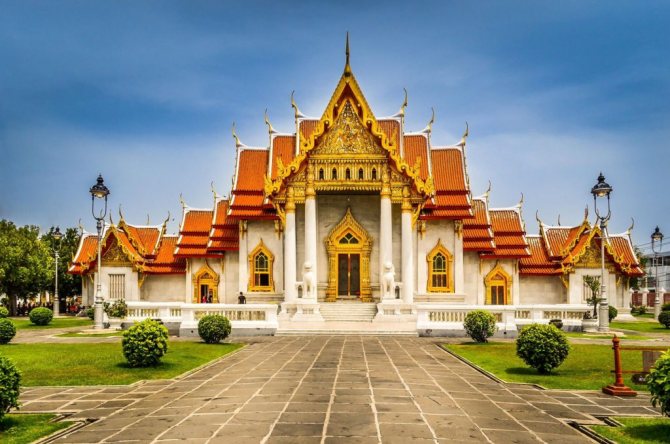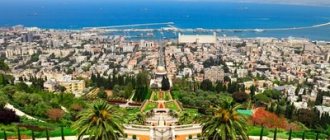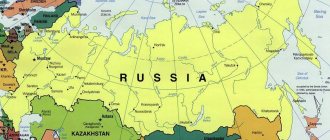These are the questions I get asked most often: How to go to live in Thailand, where to go for the winter in Thailand, how to find a job there, how much money do you need to live in Thailand and where to go there in general? — The last one surprises me most, because people sometimes want to go to a place they’ve never been to, just to get away from Russia.
The optimal lifespan in paradise Thailand for most visitors is 3-5 years. After this period, you will almost certainly want to start exploring some other, more diverse countries.
Thai Citizenship
Obtaining Thai citizenship is theoretically possible, but in practice it is very difficult and expensive. I don’t know a single person who has received Thai citizenship, although I have lived here for several years and know a lot of people.
The most important thing is why it is needed: The only advantage of Thai citizenship over work or student visas is that you can own land, work, for example, as a tuk-tuk driver, and vote in elections. At the same time, you are deprived of Russian citizenship and doom yourself and your children to live in an Asian country in which you cannot understand what will happen tomorrow (there are no pensions in Thailand, for example), and foreigners will always be strangers in Thai society - this is much more obvious than strangers in Europe .
You can live in Thailand for years without citizenship, using visas (see next paragraph). For me, Thailand is a wonderful country in which you can travel to and from, in which you can live for several years or spend the winter, but no more. I still want to have citizenship in a more predictable country.
Steps to obtain Thai citizenship (in theory):
1. Obtaining a visa to Thailand for long-term stay (at least 3 years). 2. After 3 years of living in Thailand, obtaining a residence permit and living in the country for at least 10 years. 3. After 10 years of living in Thailand, obtaining citizenship (nationality of the Kingdom of Thailand).
What you need to obtain Thai citizenship (requirements):
1. Permanent residence (resident) in Thailand for at least 10 years. 2. Possession of a permanent residence permit (CI). 3. At least 21 years of age. 4. No criminal record within Thailand. 5. Knowledge of the basics of the Thai language (passing the exam). 6. Paid receipts for paperwork (approx. 10,000 baht, but the amount needs to be clarified). 7. It is highly desirable to have a wife (husband) of Thai origin.
Applying for a family visa to live in Thailand
You can get a residence permit in Thailand with a family visa. A family visa is issued to those whose spouse works in Thailand or has their own business, also if children study in Thailand at an international school.
A family visa costs 9,000 baht. And children’s schooling must be paid, depending on what grade the child is in. For primary school education you will have to pay one hundred thousand baht per year, for high school education - three hundred thousand baht. Education in international schools has a high level of education, and the education for children is comfortable. Teaching and communication with children takes place in English. As a result, children are given an international diploma, with which they can enter higher educational institutions in Europe and America.
You can find a private school in English that costs about thirty thousand baht per year of study, and they give you a Thai diploma.
Wintering in Thailand
This is a common practice among many foreigners. People from many countries live in Thailand in the winter and go home in the summer. The Russians, one might say, are just beginning to master the life of migratory birds. For winterers, you don’t have to think about citizenship at all, but get by with tourist visas obtained in Russia, which can be extended from Thailand. I have written a special detailed post about how to go to Thailand for the winter and not only - I recommend bookmarking it, because it’s big but useful: How to go to Thailand, a guide
Relocation Opportunities
It’s easiest for Russians: to stay in the country for 30 days, you don’t need a visa at all. For citizens of Ukraine and Kazakhstan, this period is 15 days. There are no concessions for Belarusians - you must immediately contact the consulate to obtain a visa.
Previously, Russians had the opportunity to cross the border into a neighboring country and again stay in Thailand for 30 days without additional permission. But now there is a high probability that they will refuse at the border. Therefore, if you plan to stay in the country for at least the winter, it is better to immediately aim for a visa with a corridor of three months. You can extend your stay for another month while in the country.
To apply for a long-term visa and obtain a residence permit, you will need more compelling reasons than tourism:
- entering a university or taking educational courses in Thailand (for example, language courses);
- participation in the Thailand Elite program with investments from $15 thousand;
- apparatus employed;
- opening a business;
- marriage with a local resident.
Read more about visa features and opportunities for moving to Thailand in our materials:
- Visa regime and residence permit in Thailand
- How to move to Southeast Asia: Thailand, Vietnam, Indonesia or Malaysia?
Visas to Thailand. How to live in Thailand for a long time
You can live on a visa in Thailand for years. You can come to Thailand without a visa at all (at the airport you will be given a stamp for a 30-day stay in Thailand without a visa if you have a Russian passport).
If you want to stay in Thailand for more than a month, you can get a visa in Russia (for 6 months of residence, convenient for winterers), or in Asia - by leaving Thailand for a visa for 2-3 days in a neighboring country. Such a trip is inexpensive (from $150-250, depending on where and how you go) and is usually more of a trip to a new country.
There are many types of visas: tourist (if you want to live in Thailand for 3-6 months or longer), student (1 year or longer), business visa (work in Thailand), pension (if you are over 50 years old) and many other. Getting them is much easier than it seems. I have written a separate post about this in more detail, which is updated depending on the unstable visa situation in Thailand: Visas to Thailand - how to live here for a long time and legally >>
Local Themis and Thai mentality
Before you go to live in Thailand , get ready to accept the simple truth without offense or complexes: the farang there is always wrong! Even despite the fact that the budget of this country consists of 6% of the money that tourists bring with them. And the fact that official policy is aimed at cultivating friendliness and hospitality. For Thais, the tourism industry is a parallel universe with which they want nothing to do except money.

Even after moving for permanent residence and living in Thailand for several decades, you will not cease to be a farang, a source of enrichment. Just seeing a European, the trader doubles the price, so it is important to know how to bargain in Thai markets. This is similar to how Muscovites are treated in the provinces, only much more brazenly and openly. For the local corrupt tourist police, you are also a source of income. They will explain the amount of the bribe to you, but it is very difficult for them to prove their innocence and rightness, even if there is irrefutable evidence (more on this in the next article).
Also forget about the law protecting consumer rights, it doesn’t work for farangs. Did you buy a low-quality item? It's your problem, you won't be able to exchange it for another one or get your money back. Well, local police will definitely come to meet those who are especially persistent.
Where is the best place to live in Thailand?
It’s better, of course, to first travel around Thailand yourself and choose based on your preferences, or you can live in different places in Thailand (as I did, for example).
→Review of places: where to go in Thailand - if you are seriously asking this question, I recommend reading my personal review. There is a lot written in it, but concisely, subjectively, but based on facts.
If we talk briefly about the main places, it will turn out something like this:
Life in Bangkok
Bangkok is my favorite city (but after two years I got tired of it and left, although I always return with pleasure as to my native place). This is a kind of Noah's Ark with representatives of all human races and classes. You can work a lot and actively in it, you can find many “your” people with similar interests. You can have a lot of acquaintances in it, or you can have no one. A city with slums and skyscrapers, without the sea and relaxation.
Life in Pattaya
Pattaya is the Russian (it seems that it will soon be Chinese) part of Thailand. Busy, party-oriented, with nightlife and a dirty sea, but it also has wonderful quiet places with a clear sea (I described one here) and the opportunity to find a job and not even know English and Thai. From Pattaya it is also convenient to travel throughout Thailand. In general, this place has its advantages.
Life in Phuket
Phuket - there are places here that are very similar to Pattaya, but Phuket has excellent beaches with absolutely clear water - just like in the pictures and in our imaginary expectations. The good thing about Phuket is that it is very large and there are many very different places in it, but this is both a plus and a minus - it is more difficult to move around. Many people live in Phuket, work a lot and don’t see the sea for months... There is “action” here, social life and normal shops. This is my least favorite place in Thailand - it just so happens.
Koh Samui for life in Thailand
Koh Samui is a tropical village with the opportunity to live near or near the sea. This is my favorite place to live in Thailand...
Chiang Mai, Pai, Northern Thailand for life
Northern Thailand: Chiang Mai, Pai, Mae Hong Son - wonderful places. There are mountains, waterfalls, and it can even be cold. And in the North of Thailand there is no SEA. Creative people live here and there are not very many Russians, but there are already their own “communities”.
Work in Thailand
Work is work in Africa too. Many who live and work in Thailand do not swim in the sea for months, for example (even if they live close to the sea).
Getting a job in Thailand is difficult, but possible - just like anywhere else. Your chances will increase if you speak English and know for sure that you want to stay here.
Working as a teacher in Thailand
It is quite possible to get a job as a teacher in Thailand (for example, English and other subjects). You just need to come here and do it on the spot (or read the Bangkok Teachers Forum in advance: ajarnforum.net/vb). Do not rush and get a job through intermediaries - intermediary firms sometimes take half the salary (during the contract period) for their services.
Working as a photographer in Thailand
It is possible to get a job as a photographer in a company in Thailand, but it will be a “hard job.” Cheap and plentiful.
Registering a company or work permit and working as a photographer legally and independently will cost around 100-120 thousand baht per year (with all expenses).
To do this, you need to find a competent lawyer and consult with him in the place where you plan to work in Thailand.
Guides, sellers, administrators, etc.
Also, sometimes guides, salespeople, educators, assistants for different companies and various specialists . You can look for work on forums and groups about Thailand on VKontakte and Google. Some of them are listed in my article: How to work remotely.
If you find a job in Thailand , ask the employer whether you will work legally, with a special permit (work permit) or not. For example, this year, legality checks are being carried out across the country and illegal immigrants are caught and taken to prison, where they extort a lot of money, or open a criminal case.
If you are not one of the cowardly dozen, then you can work illegally. I know several teachers at schools and universities who don’t have a work permit because they don’t want to lose half their salary on getting one.
List of works prohibited for foreigners. Guides are also included here, but this does not prevent them from working here:
- Work as a salesperson in all types of trading enterprises;
- work of a financial controller, auditor, accountant, cashier (except for performing internal audit work in companies of mixed forms of ownership);
- work as a driver of a motor vehicle or any vehicle with or without a machine drive (except for piloting aircraft of foreign airlines);
- hair cutting work, hairdressing work, work in the beauty industry;
- work on the manufacture of any wickerwork and furniture from cane, rattan, jute, straw or bamboo;
- work as a cook, waiter;
- work as a water vehicle driver;
- work as a tourist guide or tour guide (guides disguise themselves as other activities); (all 33 points here: 2-thai.ru/work.html)
You can look for a job in advance and obtain a Work permit from the employer. For example, write letters to dive centers and ask not only for training to become a dive master, but also immediately agree on a job in advance.
With knowledge of English, you can Google in English and get a job as a teacher or IT specialist, programmer, designer, layout designer and editor in Thai newspapers, and so on.
Relocation methods for Russians
Immigration rules in 2021 are similar to those in force in 2018. There are several options to legalize your stay in the country, which can be found out at the consulates:
- apply for a student visa;
- find a job and get a WorkPermit;
- go to your spouse who has already got a job;
- register a marriage with a local resident;
- open a company;
- invest a certain amount in the country's economy;
- move in retirement.
On a student visa
Regardless of age, foreigners can enroll in local universities and get an education. Often, Russians arrange for their children to study, and they themselves receive a long-term visa as an accompanying person.
There is an option to enroll in courses on new culinary techniques, language learning, and Thai boxing classes. It doesn’t matter what you plan to study in Thailand. You can attend language courses indefinitely if you want to take root here.
The main thing is to pay money on time and attend classes, although sometimes absences can be negotiated. The authorities have recently begun to control students - they visit a group without warning, call a certain name and take a photo to see if there is such a person or not. To avoid problems, it is better not to skip school.
A student visa is issued for both course participants and university students. If you want to stay in the kingdom for a long time, your student visa is extended there, changing only the courses. And this can be done for 15 years.
To get a visa you need:
- choose an educational institution and submit documents according to its requirements;
- receive an Admission Letter - a document confirming admission to study;
- apply for a 90-day visa;
- arrive in the country, pay for studies;
- Appear at the immigration office to obtain a one-year student visa.
You cannot work on the basis of a student visa, but there is an option for obtaining a work permit, which can easily lift the ban. Further, the student visa is extended every 3 months for a fee. Important information: after 3 years of staying in the country with a student visa, you can apply for a residence permit.
Work permit
Low-skilled jobs in the country are filled. Therefore, to obtain permission to start an activity, you need to be a specialist in the following profession:
- designer (clothing, landscape);
- teacher who knows English at level C1, C2;
- IT specialist (designer, layout designer, etc.);
- scientist;
- Technical Specialist;
- fashion show model;
- top manager.
Despite a number of restrictions on the employment of foreigners, Russians also occupy ordinary positions. In this case, employers manage to register a position that is not on the list of prohibited ones. Russian-speaking people get jobs as administrators in small hotels, travel agents, and realtors. Illegal earnings are prohibited, and police often catch violators by conducting unscheduled raids. Those caught breaking the law are sent to a local jail and deported.
Thai law prohibits foreigners from working in positions that Thais can handle. The list of prohibited professions includes: lawyers and architects, accountants and builders, salesmen and drivers, hairdressers, guides, secretaries. Foreigners should not be involved in the following areas: fishing, advertising, mining, organizing auctions, making hats, shoes, and musical instruments. It is strictly prohibited to make any products with the image of Buddha.
You can legally get a permanent job as a cook (average salary $400), DJ ($600), fitness trainer ($700), English teacher ($650), etc. The most in-demand professions are considered to be those that are related to IT technologies. If a specialist knows several programming languages, he has a special advantage when finding a job.
Follow your spouse
If one of the spouses opened a company in Thailand or officially took a long-term job, the second spouse and children are allowed to legally come to live in the country. Children of foreign parents attend kindergartens, schools, and international universities. Training is paid. Children learn Thai and English in a relaxed, interesting program and can later go to study in Europe and America. For a spouse, permission to enter the country will cost 9 thousand baht. It's relatively cheap.
Marrying a Thai resident
In Thailand, mixed marriages are not uncommon. There are couples where the husband is Thai and the wife is Russian, and vice versa. This is one of the grounds for obtaining permanent residence. It is more difficult for Russian men to obtain the desired status through marriage - they need to have about 400 thousand baht in their account and live 12 years in the country before receiving citizenship. It's easier for Russians. They receive status after 3 – 5 years, there are no requirements for the amount in the bank account.
When officially registering a marriage, Russians can count on permanent residence immediately after completing the documents. A foreigner who marries a citizen of the kingdom acquires the right to employment and permanent residence, but his wife is deprived of the country's citizenship and receives the same status as her spouse - permanent residence. After 12 years, she can again become a Thai citizen and enjoy all the benefits she is entitled to.

Start business
Having a certain amount at your disposal, you can immigrate by opening a company. It is more convenient and easier to invest in an existing business than to open everything from scratch - this way you will need fewer documents and associated fees. A prerequisite for opening a company is the share participation of a local citizen in the amount of 51%. If someone doesn’t mind sharing a share of ownership, you can act.
To obtain a residence permit based on business in the country, you need to meet the following requirements:
- the company's authorized capital – from 65.5 thousand dollars;
- a business visa can be obtained for one year with the possibility of extension;
- the company must generate income, otherwise it will be impossible to extend its life.
Some businessmen simplify their task by registering marriage with local women. They transfer a controlling stake to them. When planning to do this, you need to remember that fictitious marriages are strictly punished in the kingdom. To avoid additional problems, it is better to use proven methods.
Russian entrepreneurs choose those areas of business that Thailand needs most. This is traditional medicine, programming, learning foreign languages.
Investing in real estate or the economy
The attractiveness of local properties for investment is high. Those who wish can buy real estate for subsequent rental and receive 9% income. Developers offer to invest in real estate using the Thailand Elite program - after receiving the rights to own a home, you can get a multiple visa for 20 years. Let me add that in Thailand there are many other attractive programs for investors - Elite Easy Access, Elite Superiority Extension, Elite Family Excursion. The terms of the program provide for a one-time payment from a foreigner in exchange for the right to obtain permanent residence.
Visitors from abroad can obtain a residence permit if they invest at least 200 thousand dollars in the local economy. Investment objects: public and private companies, government bonds, international commercial projects. For particularly large investments, permanent residence is immediately issued by decision of the government of the country.
Long-term visas for retirees
Some Russian pensioners are tempted by the opportunity to go to the sea and live in warmer climes. There are separate programs for them in Thailand. A foreign pensioner after 50 years of age with 26 thousand dollars can apply for a long-term visa for 1 year with the possibility of extension as many times as desired. If an elderly couple immigrates to Thailand, it is enough that one of the spouses has the specified amount in their account. After only 3 years you can obtain permanent residence, which does not require renewal. Judging by the reviews on the forums, many retirees have already taken advantage of the program and successfully moved to Thailand.
Business in Thailand
Buying a business in Thailand (including from Russians) is a rather risky undertaking. I can just give an example. There are miserable places that constantly pass to new owners. For example, one Russian restaurant on Samui. And there is always bad food and high prices. Because someone buys this place and thinks that it will work on its own... And there are guys who came to Samui from a Siberian town and opened their own establishment here with a minimum of expenses, cook and work themselves - it turns out very tasty and cozy ( there is an interview with them on my blog).
Those successful businesses that I know in Thailand were created with their own enthusiasm and soul (though it’s not a fact that this will help everyone).
I heard that it is profitable to buy rubber plantations in Thailand, but I know almost nothing about it - just as a topic for research for anyone interested.
I am often asked how to work as a photographer in Thailand , where to look for clients, etc. This is done in exactly the same way as when working as a photographer in Russia. You look for your clients yourself, through the Internet and word of mouth. At the moment, I cannot recommend engaging in this type of activity, because... The police began actively checking photographers for legality, and legalization here is quite expensive (about 120 thousand baht per year).
In Thailand it is easier than in Russia to open your own bar or restaurant. Usually, the legal aspects are outsourced, and all you have to do is find premises or buy an already established business.
List of prohibited activities in Thailand for foreigners
First category:
Newspaper business, radio broadcasting or television business. Rice farming, farming or gardening. Animal husbandry. Forestry, wood production from natural wood. Fishing for marine animals in Thai waters and within specific economic zones of Thailand. Extraction of Thai herbs. Trading and auctioning of Thai antiques and national historical objects. Making or casting Buddha images and monk alms bowls. Land trade.
Second category:
First group: Businesses related to national security or safety.
Production, sales and maintenance of: Firearms, ammunition, gunpowder, explosives. Firearms, ammunition and explosives accessories. Equipment or components, all categories of military materials. Land, water or air transportation, including domestic airline business.
Second group: Business involving art and culture, traditional and folk crafts.
Trade antiques or artistic objects representing Thai art or craft. Production of carved wood. Silkworm farming, Thai silk yarn production, Thai silk weaving or Thai silk printing. Production of Thai musical instruments. Manufacture of gold items, silver items, niello items, bronze items or lacquer items. Production of tableware of Thai arts and culture.
Third group: Business affecting natural resources or the environment.
Production of sugar and sugar cane. Salt agriculture, including underground salt. Rock salt mining industry. Mining, including blasting or crushing rock. Wooden manufacturing for the production of furniture and tableware.
Third category:
Rice milling and production of flour from rice and agricultural products. Fisheries, specifically the culture of marine animals. Forestry from afforestation. Production of plywood, chipboard or fiberboard. Lime production. Accounting or business services. Legal business services. Architectural business services. Engineering business services. Construction, excluding: Construction providing essential services to the public in the areas of public utilities or transportation, requiring special tools, machinery, technology or construction expertise, having a minimum foreigner capital of 500 million baht or more. Other categories of construction as prescribed in accordance with the ministerial regulations. Broker or agent of business, except: To be a broker or agent for the underwriting of securities or services related to future trading of commodities or financial instruments or securities. Be a broker or agent for trading or providing goods or services necessary for the production or provision of services between affiliated businesses. Be a broker or agent for trading, purchasing or distributing or seeking domestic and foreign markets for the sale of domestic or imported goods in international business transactions, having a minimum foreigner capital of 100 million baht or more. Be a broker or agent of another category as prescribed by ministerial regulations. Auction other than: An international auction other than an auction of antiques, historical artifacts or artistic objects that are Thai works of art, handicrafts or antiques of historical value. Other auction categories as prescribed in accordance with the ministerial regulations. Internal trade related to native products or the production of which is not yet prohibited by law. Retail sale of all categories of goods having a total minimum capital of less than 100 million baht or having a minimum capital of each store of less than 20 million baht. Wholesale of all categories of goods with a minimum capital of each store of less than 100 million baht. Advertising business. Hotel business, excluding hotel management services. Sightseeing - tourist trip. Sale of food or drinks. Crop production and business distribution. Other categories of business services, except as prescribed in accordance with the ministerial regulations.
Other laws affecting foreign business transactions:
Banking and finance businesses, according to their own special laws, must be at least 75% Thai owned. Also, companies engaged in inland shipping must be at least 70% Thai owned. According to regulations, insurance companies and insurance brokers must be at least 75% Thai owned.
Companies that own land are required by the Land Law to be 51% Thai owned if they have special promotional privileges. A higher degree of Thai ownership is currently being considered.
How much money do you need to live in Thailand?
Before the fall of the ruble, our expenses were approximately the same as in Russia. Now more money is spent in Thailand than in Russia (maybe about the same as in Moscow). Housing rental: from $300 per month (if rented for several months) for a small house or apartment with a minimum of amenities, from $800 for a two-room house/normal apartment. There are houses and villas that are more expensive and more comfortable for as much as your heart desires (a lot). In Bangkok, for example, renting a 2-room apartment with an average annual contract costs approximately $900. Lower class is cheaper. Good level - more expensive. There are excellent apartments for $6 thousand a month.
I wrote a separate post about this here: How much does life cost in Thailand?
I have described the prices in Thailand in great detail, but in a compact and quick way you can see how much it costs here.
Features of life in Thailand
- HEAT. It’s not very hot here in winter, very hot in summer, but it’s always hot.
- Because of the heat, calmness, laziness and indifference awaken (Thais become more understandable).
- We will never belong in this country. The only Thais here are their own - this is their country, to which many want to come and from which they (the Thais) do not want to leave.
- Thais, or rather their mentality, which is unusual for us, about which I wrote a little in the post How Thais treat us and what they are like in general.
- Time passes completely differently than in Russia. It disappears. And I can never immediately remember what day of the week it is and what month it is.
- I have written a separate but brief post about the “cons” of living in Thailand: Disadvantages of living in Asia.
- The real and imaginary dangers of life in Asia have been written in detail, but briefly here: Dangers of Asia.
Language problems
Let's continue our subscriber's review with one stereotype, which says that Russian is the most difficult language in the world. There is nothing more complex than the languages of the peoples living on the Indochina Peninsula. They are phonetic. A slight change in the tone of the spoken word can turn a polite greeting into a dirty curse. Read an article that reveals the secrets of the tonality of the Thai language.
Yes, in Thailand there is a well-developed network of language courses where you can learn English. Only there are few Thais who want (or rather are able) to visit them. Local traders and guides make do with a limited supply of foreign words to enable them to communicate with the farangs. The rest of the Thai people will not understand you, even if you really want to. After all, even their sign language is different.
But even if you more or less learn the language of the locals, you will never become part of their society, as can happen in Germany or France. Differences in mentality will stand in your way.
Travel insurance for Thailand
The cost of insurance in Thailand is now much higher than just a couple of years ago. There are too many insurance claims in Asia and we are costing the insurance company too much. On the one hand, this means that it is really better to have insurance here than not to have it - hospital care for tourists is very expensive, and visits happen frequently. On the other hand, over time, after arriving here, you can find more inexpensive options with local insurance (usually a non-tourist visa is required for this).
To begin with, insurance can be obtained through our insurance companies. You can do this through a trusted company (if you are in Russia or Thailand - it doesn’t matter) on my blog on this page (information is constantly updated, there is a discount for blog readers): Get insurance at a discount.










